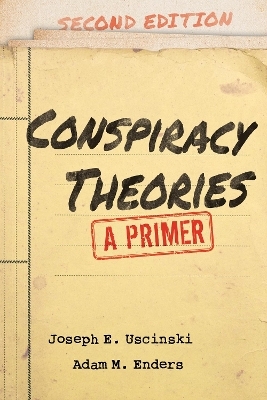
Conspiracy Theories
Rowman & Littlefield (Verlag)
978-1-5381-7325-1 (ISBN)
The second edition of this popular text, updated throughout and now including Covid-19 and the 2020 presidential election and aftermath, introduces students to the research into conspiracy theories and the people who propagate and believe them. In doing so, Uscinski and Enders address the psychological, sociological, and political sources of conspiracy theorizing. They rigorously analyze the most current arguments and evidence while providing numerous real-world examples so students can contextualize the current debates. Each chapter addresses important current questions, provides conceptual tools, defines important terms, and introduces the appropriate methods of analysis.
Joseph E. Uscinski is associate professor of political science at University of Miami. He is editor of Conspiracy Theories and the People Who Believe Them (forthcoming), coauthor of American Conspiracy Theories (2014) and author of The People’s News: Media, Politics, and the Demands of Capitalism (2014). Adam Enders is an Assistant Professor of Political Science at the University of Louisville. His research focuses on the role of suspicion and conspiratorial thinking in American mass politics, the influence of core values on political identities and attitudes, and the evolving nature of mass polarization.
Chapter 1 Why Study Conspiracy Theories?
Why Are Conspiracy Theories Important?
Kennedy Assassination and Other Conspiracy Theories
Why Are Conspiracy Theories Important?
The Popular Misconceptions
Conspiracy theories are more popular now
Conspiracy Theories are Extreme
Conspiracy Theories are for the Mentally Ill
Conservatives Believe More Conspiracy Theories than Liberals
Conspiracy Theories are More Popular in the US (or in some other place)
Plan of the Book
Chapter 2 What is a Conspiracy Theory?
Defining Our Terms
Conspiracy
Conspiracy Theory
Falsifiability
Other Standards for Evaluating Conspiracy Theories
The Diversity of Conspiracy Theories
The Conspirators
The Number of Conspirators
When Do People Conspire?
The Methods
The Goals
Conspiracy Theory Beliefs
Conspiracy Thinking
Conspiracy Theorist
The Post-Truth World?
Anomalous Beliefs
Conclusion
Chapter 3 The Popularity of Conspiracy and Anomalous Beliefs
Measurement
Conspiracy Theories and Poll Numbers
Immigration Conspiracy Theories
Government Malfeasance
Extraterrestrial Cover-up
Malevolent Global Conspiracies
Personal Well-being
Control of Information
Anomalistic Beliefs
Conclusion
Chapter 4 The Psychology and Sociology of Conspiracy Theories
Psychological Factors
Cognitive Traits
Personality Traits
Psychological Conditions
Criticisms of the Psychological Approach
Sociological Factors
Conclusion
Chapter 5 The Politics of Conspiracy Theories
Power and Conspiracy Theories
The Locus of Power
Partisan Conspiracy Theorizing
Opinion Formation
The Hypodermic Needle Theory
The Minimal Effects Model
Partisanship and Conspiracy Theory Beliefs
Symmetry
The Interaction between Partisanship and Conspiracy Thinking
Conspiracy Theories Are for Losers
Conclusion
Chapter 6 Donald Trump and the Elections of 2016 and 2020
Donald Trump Runs for President
Anti-Establishment Orientations
Trump-Russia Conspiracy Theories
Consequences of Conspiracy Theory Politics
Conclusion
Chapter 7 QAnon, COVID-19, Social Media, and The Era of “Post-truth”QAnon
COVID-19 Conspiracy Theories
Other Conspiracy Theory Beliefs Over Time
Online Exposure to Conspiracy Theories
Does Online Exposure Spread Conspiracy Theories?
The Effect of Conspiracy Theory Beliefs on Deleterious Actions
A New Satanic Panic
Curtailing the Spread and Effects of Conspiracy Theories
Conclusions
Appendix
| Erscheinungsdatum | 07.03.2023 |
|---|---|
| Verlagsort | Lanham, MD |
| Sprache | englisch |
| Maße | 153 x 223 mm |
| Gewicht | 331 g |
| Themenwelt | Geisteswissenschaften ► Philosophie ► Erkenntnistheorie / Wissenschaftstheorie |
| Sozialwissenschaften ► Politik / Verwaltung ► Politische Systeme | |
| Sozialwissenschaften ► Politik / Verwaltung ► Politische Theorie | |
| Sozialwissenschaften ► Soziologie | |
| ISBN-10 | 1-5381-7325-5 / 1538173255 |
| ISBN-13 | 978-1-5381-7325-1 / 9781538173251 |
| Zustand | Neuware |
| Haben Sie eine Frage zum Produkt? |
aus dem Bereich


![Was heißt Denken?. Vorlesung Wintersemester 1951/52. [Was bedeutet das alles?] - Martin Heidegger](/media/113619842)